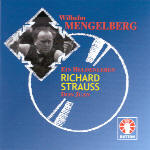Michael Dutton has amassed quite a catalog of historic reissues. His radical remastering techniques utilize added reverberation and a soupçon of stereo spread, devices that invoke the wrath of non-interventionist transfer agents. While my own ears generally gravitate toward “purist” transfers, I sometimes find Dutton’s methods actually enhance certain old recordings to the music’s benefit. Take, for instance, Willem Mengelberg’s 1941 Concertgebouw recording of Richard Strauss’ Ein Heldenleben. The original 78 shellac pressings reveal a slightly resonant but not quite evenly balanced orchestral image. Dutton’s added resonance helps the poly-textural complexities of “The Hero’s Battlefield” to breathe. On the other hand, Dutton’s side joins are more perceptible than Seth Winner’s seamless edits for Teldec. Mengelberg’s 1938 Don Juan boasts unusually clear, beautufully balanced engineering for its vintage. For this reason Dutton’s knob twiddling draws more attention to itself than the recording at hand compared to Winner’s more natural sounding equalization. Don Juan is also more convincing as a performance. Mengelberg’s patented tempo fluctuations and overt mannerisms are fashioned with specificity and purpose.
In the case of Ein Heldenleben, however, similar interpretive gestures divert rather than engage our attention to the composer’s chestbeating largesse. This is not the case concerning the conductor’s justly famous (and better played) 1928 New York Philharmonic Ein Heldenleben. So which is it, Teldec or Dutton? One solution is to forgo the 1941 Heldenleben. Instead, get a Preiser reissue that includes a very decent transfer of the Don Juan, coupled with the excellent Koussevitsky/Boston Symphony Till Eulenspiegel and Carl Schuricht’s slithery romp through Strauss’ Sinfonia Domestica with a surprisingly responsive La Scala Orchestra. But if you chiefly want the Mengelberg/Concertgebouw Heldenleben, Dutton’s your transfer guy.
































